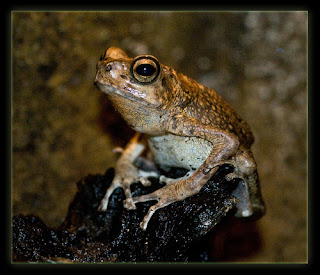True Wild Life | African Tree Toad | The African tree toad is a small species of toad found in the forests of central Africa. Today, little is still known about this tiny amphibian and the constantly decreasing population numbers of the African tree toad are making it increasingly difficult for us to learn more about them. The African tree toad is found distributed across it's natural central African range in countries such as Cameroon, Democratic Republic of the Congo, Equatorial Guinea, Gabon, Nigeria, possibly Central African Republic, and possibly Republic of the Congo.
There are two known subspecies of African tree toad, which are the African tree toad and the Bates' tree toad. Both African tree toad species are of similar size and colour but tend to differ in the geographical regions which they inhabit. The natural habitats of the African tree toad are subtropical or tropical moist lowland forests and heavily degraded former forest, where there is a plentiful water supply. The African tree toad is generally dark to light brown in colour, with white patches on it's belly and like other toad species, the African tree toad has slightly webbed feet which aid it's semi-aquatic and tree climbing lifestyle.
The African tree toad is a carnivorous amphibian that shoots it's long, sticky tongue out of it's mouth at incredible speeds to catch and secure it's prey. The African tree toad primarily hunts small invertebrates including insects, worms and spiders. Due to its small size, the African tree toad has numerous predators within it's warm, woodland environment. Fish, birds, lizards, snakes, rodents and larger amphibians like frogs and toads are all common predators of the African tree toad.
Little is really known about the reproduction of the African tree toad besides the fact that female African tree toads lay up to 200 sticky eggs in small bodies of water, which are then guarded by the male African tree toad until they hatch into tadpoles. Today, the African tree toad is a rare and highly endangered species with only a handful thought to be left in the African forests. Habitat loss caused by deforestation and rising pollution levels are thought to be the two main causes in the African tree toad's decline.




.jpg)



